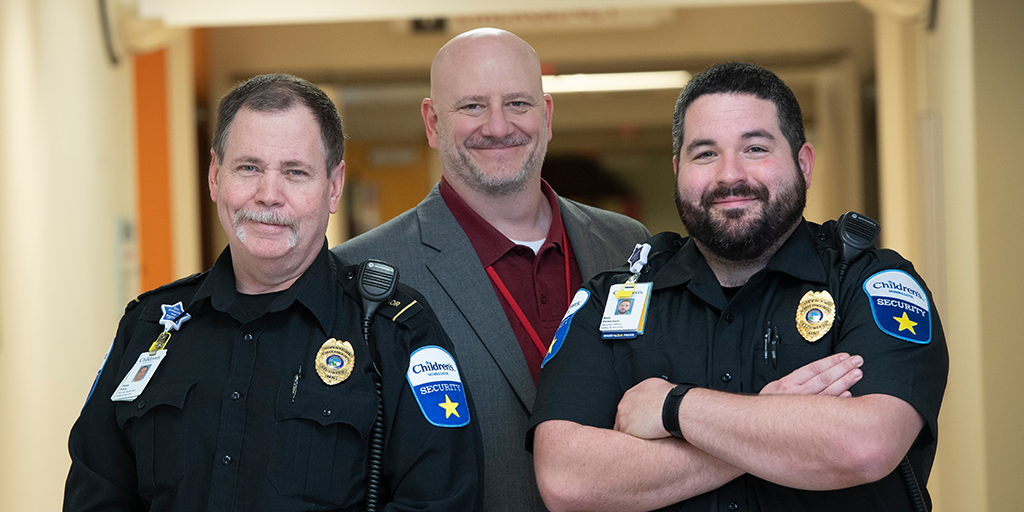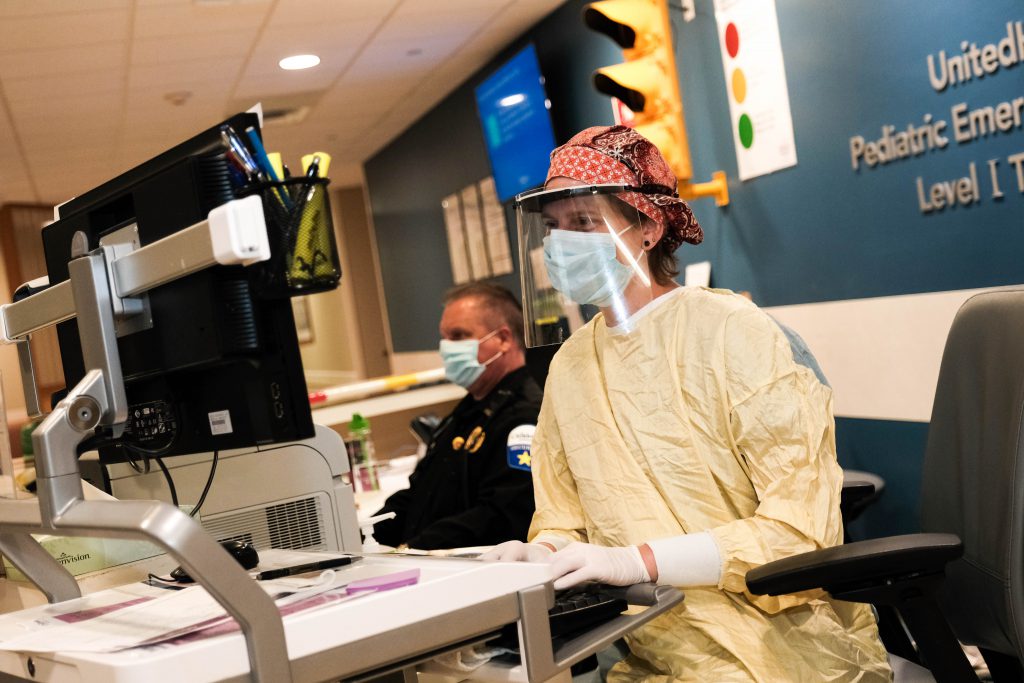Hospitals serve hundreds of people every day who are facing some of the best and worst days of their lives. Doctors and nurses are hard at work to ensure everyone is taken care of, but there are also essential people like hospital security officers who do their part to keep the community safe. We’ll cover the steps it takes to begin a career in hospital security:
- What Does a Hospital Security Officer Do?
- Types of Security Hospital Jobs
- How to Become a Hospital Security Officer
- Is Hospital Security a Good Career Path? Job Outlook
- What Qualifications Do You Need to Become a Security Officer?
- Do Hospital Security Officers Need to Be Certified?
- Certified Hospital Security Officer Jobs at Children’s Minnesota
Hospitals serve hundreds of people every day who are facing some of the best and worst days of their lives. Doctors and nurses are hard at work to ensure everyone is taken care of, but there are also essential people like hospital security officers who do their part to keep the community safe. We’ll cover the steps it takes to begin a career in hospital security:
- What Does a Hospital Security Officer Do?
- Types of Security Hospital Jobs
- How to Become a Hospital Security Officer
- Is Hospital Security a Good Career Path? Job Outlook
- What Qualifications Do You Need to Become a Security Officer?
- Do Hospital Security Officers Need to Be Certified?
- Certified Hospital Security Officer Jobs at Children’s Minnesota
What Does a Certified Hospital Security Officers Do?
The responsibility and support that hospital and medical security officers provide to staff and patients play a crucial role in keeping everyone safe to receive the best care. This job also offers an excellent opportunity to know medical staff, patients, and visitor environments while navigating your career path. Though it might seem more intimidating to take on a hospital security officer position, the qualifications to become a security officer are relatively straightforward and achievable.

Managing hospital safety and security is vital to keep everything running smoothly. Security officers observe the well-being of everyone through a bird’s eye view in security cameras, being posted on floors near entrances and exits, or in offices near many areas of the facility.
There are more than just doctors, nurses, and patients coming in and out of doors at a hospital. Security officers are paying attention to the loved ones visiting patients, additional employees such as kitchen staff, custodians and caretakers, suppliers, social workers, and countless other people who indirectly impact those in the building. In addition, hospital security officers respond to threats such as theft, vandalism, and fire to more extreme dangers such as abduction or assault.
Types of Security Hospital Jobs
A hospital security officer position is a great role to harness emotional intelligence skills such as empathy, compassion, self-regulation, and active listening. It also combines skills such as analysis, communication, critical thinking, and problem solving.
Though a security officer role may seem relatively broad, a hospital is a unique place where many different types of security services are needed.
Hospital Security Supervisor and Management
The hospital security supervisor and management iare responsible for overseeing the security practices and procedures throughout the hospital or facility. This individual is also responsible for managing the highest stress scenarios and working with outside agencies such as law enforcement or fire departments during the most extreme emergencies.
Security Officer
The security officers are responsible for walking the perimeter of the building both outside and on individual floors. Not only do they keep an eye out for suspicious activity but they help visitors navigate the complex floors of a hospital, provide on-site support to staff when tensions rise.
Security Dispatcher
The security dispatcher is responsible for monitoring security cameras, CCTV, radios and other areas across the hospital. Some technical skills are required to manage these systems and provide insight to any suspicious activity.
Psychiatric Hospital Security Officer
The responsibilities of a security officer in a psychiatric hospital or ward range from traditional safety and security issues to providing companionship to residents. The individuals staying in a psychiatric ward or working there can encounter more unpredictable scenarios that are difficult to control when emotions are elevated. Strong emotional intelligence and empathy is crucial to working as a psych ward security guard to maintain safety for everyone.
Hospital Security Post Orders
Post orders are the outline of hospital security procedures. They clearly define what exactly hospital security officers do, and the steps to be taken by personnel to align with responsibilities and expectations. For hospital security management, the post orders should be extensive, regularly updated, and detailed.
Some key areas that you will find within the post orders include the following:
- Visitor policies: This includes visiting hours, if there are limits to the number of people in a room, ID and verification requirements.
- Access control: Clarification on which individuals can enter certain parts of the hospital, or have access to certain types of information.
- Task ownership: Outlines who is responsible for managing different parts of security operations ranging from making phone calls in emergencies to filing standard paperwork.
- Emergency procedures and notifications: Clear instructions to handle emergencies that range from fires and power outages to scenarios like abductions, de-escalation, assault, or cyber security attacks.
How to Become a Hospital Security Officer
What qualifications you need to become a security officer can vary between industries which can be confusing. Some industries require very minimal levels of education or training while the qualifications to become a hospital security officer may mean more experience and advanced certification. Ultimately it will depend on the state and region you are exploring opportunities, but the basic requirements listed below will serve as a foundation to get you started in your career.
- Secure Proper Level of Education: A high school diploma or GED are required for a hospital security guard position. However, some organizations may prefer candidates with degrees in criminal justice or law enforcement.
- Security Officer License: Most states require a security officer license, or Protective Agent Services License which can take anywhere from eight to twelve hours. Check your state government website for further information and steps required. Children’s Minnesota does not require this step in our hiring procedures.
- Hospital Security Training: Includes communication, first aid, emergency procedures. In some cases, additional training programs for firearms and licensing is required.
- Certification: Certifications such as the International Association for Healthcare Security & Safety (IAHSS) Certification can set candidates apart from other applicants and strengthen already obtained skills. Children’s Minnesota does not require this step in our hiring procedures.
How Long Does it Take to Become a Healthcare Security Officer?
Hospitals have a higher than average need to fill hospital security jobs than in other industries because they are running twenty-four hours a day, seven days a week. This means that once the educational and licensing requirements are fulfilled, finding a position can happen quickly depending on your region.
A standard security officer license can be completed in eight to twelve hours, basic certification such as the IAHSS can be done in another seven to eight hours. For higher levels of certification such as advanced or supervisor levels add an additional seven to eight hours. Outside of a basic education, and if no additional college education is required, you can expect to dedicate at least sixteen hours up to thirty-two hours of your time to security training and certification before becoming a healthcare security officer.

Is Hospital Security a Good Career Path?
Hospital security positions are projected to grow by 15% over the next decade. This growth rate is higher than the average for all occupations with an anticipated 165,000 of new openings between 2020 and 2030. Many of these openings are predicted to be a result of people moving onto new careers or exiting the labor force. Additionally, choosing to be a healthcare security officer has a higher than average pay for security officers due to the high stress and complex environment.
- Estimate of Jobs available: 42,100
- Rate of projected job growth: 15%– above average growth
- New jobs to be added in the next 10-years: 165,000
- Fastest growing states for jobs: California, New York, Texas, Florida, and Illinois
Why Become a Hospital Security Officer at Children’s Minnesota

Children’s Minnesota is one of the largest freestanding pediatric health systems in the United States—with two hospitals, nine primary care clinics, seven rehabilitation, and nine specialty care sites. Everyday families, staff, and visitors witness amazing as children grow stronger and healthier through this nationally recognized, not for profit system.
Providing security at a hospital like Children’s Minnesota will have you not only keeping the community safe and secure, but put you in the front row to offer support, care, and friendship to the brilliant kids, families, and staff that are hard at work. If you are passionate about putting kids first, truly listening, and being remarkable, joining the team at Children’s Minnesota as a member of the hospital security staff is for you.
What Qualifications Do You Need to Become a Security Officer?
Key Skills and Experience for Hospital Security Officers
To have a security job at a hospital, you will want to have strong technical abilities, and emotional intelligence, also known as soft skills. As mentioned, some training and certification may be required to offer additional skills and experience, while soft skills can be learned and improved upon in your everyday life.
- Security Officer License: Provided once security guard training is completed.
- International Association for Healthcare Security & Safety (IAHSS) Certification: Fundamentals of healthcare safety, emergency management, hazardous materials and waste management, accreditation and standardization authorities, employee health and safety.
- Security Officer Training: Education on legal limits of private security, personal, civil, and criminal liability for employees vs. employers, use of force education
- Emotional Intelligence and Soft Skills: Active listening, written and oral communication, empathy, compassion, self-awareness, and self-regulation
Do You Need a Degree to be a Hospital Security Officer?
For many roles in security, higher education is not required. However, for specific industries like healthcare, it’s often preferred that certified hospital security officers have a degree that focuses on criminal justice or law enforcement. Another field of study that may seem unexpected for hospital security officers is psychology, sociology, or even social work.
All of these areas of study require courses centered around developing communication and soft skills, crisis management, psychology, human behavior, diversity, ethics, and clear policies for many different types of circumstances. Centering around community engagement and compassion studied in these degrees lays a foundation for the customer service skills needed in hospital security.
Do Hospital Security Officers Need to Be Certified?
Licenses and certifications for hospital or clinical jobs cover the basics of working in security but also the more complex variables that can arise in a medical field. Covering standard security procedures, security data analysis, and being able to help provide aid at a moment’s notice will put applicants at the top of the list for hospital security officer positions.
The many different types of licenses available further strengthen the cross-functional skills of security teams so they can partner with doctors, nurses, families, police officers, and first responders effectively and efficiently when it matters most.
Types of licenses and certifications that may further qualify employees for security officer jobs at hospitals can include:
- International Association for Hospital Security & Safety (IAHSS)
- Emergency Medical Responder (EMR) or First Responder
- Emergency Medical Technician (EMT)
- OSHA first responder
- Certified Fraud Examiner (CFE)
- Certified Protection Professional (CPP)
- Certified Forensic Interviewer
- Physical Security Professional (PSP)
- Professional Certified Investigator (PCI)
What is the IAHSS Certification?
The International Association for Hospital Security & Safety (IAHSS) is the only organization solely dedicated to educating and improving the security and safety protocols in healthcare facilities. IAHSS has certified tens of thousands of professionals to keep facilities safe in medical professions, law enforcement, and emergency management.
IAHSS certificate provides individuals with the basic knowledge of the healthcare safety to prepare them for any challenges they may encounter. Education includes:
- Healthcare Safety Fundamentals
- Accreditation and Standardization
- Employee Health and Safety
- Fire Safety
- Emergency Management
- Physical Hazards
- Hazardous Materials and Waste Management
To be IAHSS certified you must purchase and complete the workbook, and then pass the IAHSS exam.
Certified Hospital Security Officer Jobs at Children’s Minnesota
Security officer (multiple shifts): The Security Officer at the Children’s Minnesota is responsible for the day to day activities of ensuring a safe and secure Children’s campus. Apply today!
Hospital security supervisor (sign-on bonus): The Security Supervisor will supervise security staff (officers and dispatchers), including assigning work, training, coaching, and discipline. The Security Supervisor’s core role is to promote a safe environment for patients, visitors and hospital employees.

Explore Job Opportunities at Children’s Minnesota
Find opportunity at Children’s Minnesota to achieve your next career goals. With competitive compensation and benefits, you can work with passionate teams to make a difference in the lives of thousands of kids and families across Minnesota. Go here to see all jobs.